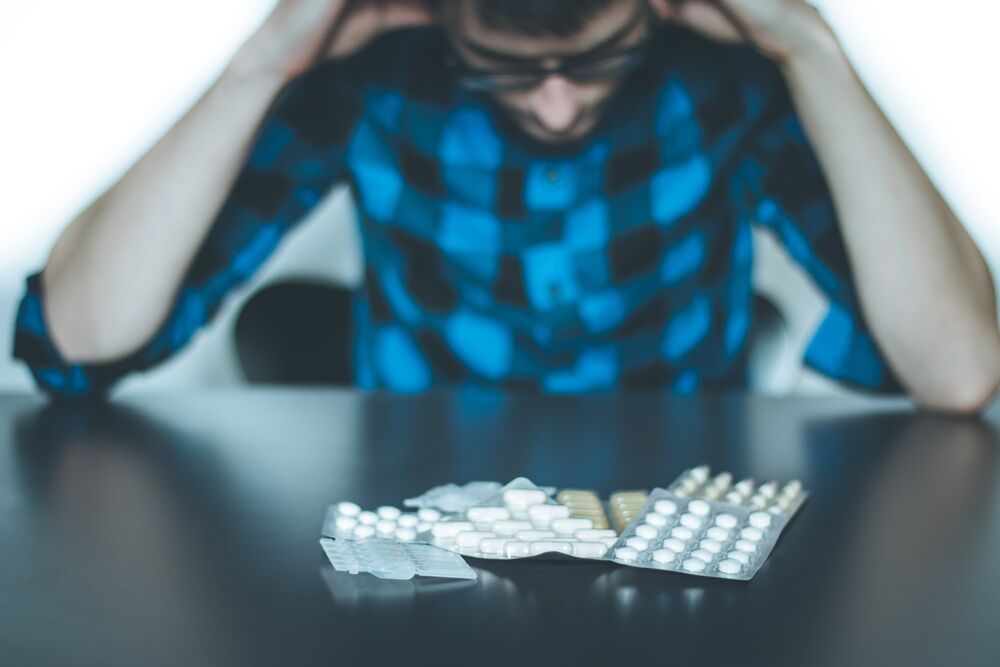Librium Addiction
Signs of Librium Addiction
Librium, with the scientific name chlordiazepoxide, is a prescription sedative that helps people
Benzodiazepine addiction is the physical dependence and persistent desire to use benzodiazepine drugs.
Most people who have a benzodiazepine addiction realize that they have one when they find it very difficult or impossible to stop using benzodiazepines or when they keep using benzodiazepines, even though it is having a negative effect on their health or life. Benzodiazepine addiction is different from benzodiazepine use. If someone is taking benzodiazepines but stops using them without any difficulty, that is a sign of non-addiction.
Benzodiazepines are a class of drugs that are used to treat anxiety, insomnia, alcohol withdrawal, and other mood problems and have a relaxing, sedative effect. Benzodiazepines work by activating receptors in the brain called gamma-Aminobutyric acid (GABA) receptors. The exact way that benzodiazepines affect these receptors is not fully understood by medical scientists. Over time, benzodiazepine misuse can occur, leading to benzodiazepine dependence and drug abuse.
Commonly used benzodiazepines include:
There are other, less common benzodiazepine prescriptions that may also sometimes be used. Benzodiazepines always require a doctor’s prescription because of the risk of overdose and misuse.

Benzodiazepines are a commonly used drug in the United States. Current benzodiazepine statistics show:
Addiction is considered by healthcare professionals to be a disease, because it is caused by physical changes in the brain. In a normal, healthy brain there is a process called the “reward pathway”. In this process, the brain releases certain types of chemicals called endorphins whenever you perform an activity that could be advantageous to repeat in the future. Endorphins cause a sensation of pleasure, happiness, and contentment when they are released.
Endorphins are released naturally when you do something that will help you to survive, prosper, or reproduce. Activities like eating, especially high energy (sweet) foods, having sex, or completing a difficult task will all release endorphins at intensities that correspond to the importance the activity has for you. This helps you want to repeat these activities again in the future and will actually rewire your brain over the long-term to seek out activities that are repeatedly rewarded.
While endorphins are released naturally in response to things that you do, benzodiazepines will also stimulate the release of endorphins into the brain. This can lead to a sensation of pleasure, and because this sensation is created chemically instead, it can be much more intense than the sensation of pleasure that occurs naturally. This artificial sensation of pleasure is called a high.
While the natural release of endorphins encourages you to repeat an activity, the powerful and intense chemical release of endorphins creates a very strong urge to repeat using the drug that caused the high. This in turns causes the release of more endorphins, further increasing the desire to use benzodiazepines. Over time, this process will rewire the brain to have a semi-permanent strong urge to use benzodiazepines, creating a benzo addiction.

Benzodiazepine addiction can lead to several short-term and long-term effects. Benzodiazepine addiction will have both physical and psychosocial effects. Benzodiazepine addiction can also lead to tolerance and dependence. Because benzodiazepines can cause a range of negative health effects, it's important to seek treatment for benzo addiction as soon as possible for yourself or a loved one.
Tolerance occurs when your brain adjusts to the effects of benzodiazepines. Your brain recognizes that the high caused by benzodiazepines is due to the use of a drug and compensates to release fewer endorphins the next time that you use benzodiazepines. Over time, the high caused by benzodiazepines becomes less intense, and it becomes necessary to use a higher and higher dose to obtain the same level of high. This leads people who are addicted to benzodiazepines to take consistently higher doses of benzodiazepines or can even cause them to use other, more dangerous recreational drugs.
Benzodiazepine dependence occurs because your body adjusts its normal function to include the presence of benzodiazepines. People who consistently use benzodiazepines will have some level of benzodiazepine in their bloodstream at most times. The body, over time, adjusts to the presence of benzodiazepines in functioning normally and gets to the point where it requires benzodiazepines to function normally. Dependence is what causes withdrawal symptoms, as the body cannot function normally when benzodiazepines are not present and have to readjust for the absence of benzodiazepines.
Benzodiazepines will cause several symptoms when used. Some of the short-term symptoms of benzodiazepine use include:
When too much benzodiazepine is used, it can cause an overdose and affect the central nervous system. Symptoms of a benzodiazepine overdose include slow or gasping breathing, no breathing, decreased or no response to touch or pain, and coma. A benzodiazepine overdose can be fatal, and you should immediately call 911 if you are with someone you suspect has overdosed on benzodiazepines.
Benzodiazepine addiction can also lead to benzodiazepine withdrawal syndrome when someone who has an addiction tries to stop using them. While withdrawal from benzodiazepine is rarely dangerous, some of the possible side effects that may occur include:
If you or someone you know is trying to stop using benzodiazepines alone, then you should consider treatment for benzodiazepine addiction if seizures or hallucinations occur. This can indicate a more severe and dangerous withdrawal.
Psychosocial effects refers to the effects of addiction on mental and social activities. The psychosocial effects of benzodiazepine addiction are not necessarily unique to benzodiazepines and apply to most addictions. Addiction can be embarrassing and may cause someone to feel guilty and like they need to hide their addiction. This leads to isolation and secrecy. It may also cause them to react with anger when asked about their changes in behavior. The overall effect on relationships is that it decreases trust, communication, and ultimately disrupts previously good relationships.
Benzodiazepine use can take up time, making someone with an addiction miss social events, have poorer performance in work or school, and increase the isolation that occurs with addiction. Addiction can lead to financial problems, as obtaining benzodiazepines becomes a financial priority and the health effects of addiction create financial stress. Benzodiazepine addiction can also lead to an increase in legal problems that often accompanies addiction.
To definitively say that a benzodiazepine addiction is present, it will require a doctor to examine the person who may have an addiction and look at their history and symptoms. Only a doctor can make the determination that a substance use disorder and benzodiazepine addiction is present.
While it does require a doctor to diagnose a benzodiazepine addiction, there are several signs that may indicate that a benzodiazepine addiction is present. If you are wondering if you personally have a benzodiazepine addiction, the key thing to look for is difficulty controlling your behaviors relating to benzodiazepine use. If you want to stop using benzodiazepines, but are finding it difficult, or if you are continuing to use benzodiazepines even though it is having a negative effect on your life, then you may have an addiction. Many people with addictions tell themselves that they could stop if they want to, but that they just don’t want to. This can also be a sign of addiction.
If you suspect someone you know may have a benzodiazepine addiction, it can be harder to tell. One of the first indicators will be a change in behavior. They may become more secretive and withdrawn. They may also start missing activities, having poorer performance at work or school, or start telling others that they are “sick” frequently.
Someone who is high on benzodiazepines will act somewhat similarly to someone who is drunk. They may have decreased coordination, slurred speech, have problems concentrating during a conversation, and maybe more drowsy. These physical symptoms can indicate that someone is misusing benzodiazepines.

Benzodiazepine addiction treatment depends greatly upon the person with the addiction recognizing their need for treatment and agreeing to seek help. Until the initial denial of addiction is overcome, treatment will likely not be successful.
Once someone has agreed to treatment, the first step will be to undergo detox. Detox is the process of the body eliminating benzodiazepines from the body while not using any more. Detox can be uncomfortable and will be the period in which withdrawal symptoms will occur. Benzodiazepine detox may last for about a week.
Once medical detox is complete, the focus of treatment will shift on to learning coping mechanisms and rewiring the brain to overcome the behaviors of addiction. This may involve one-on-one therapy, group therapy, medications, and other treatment options. Cognitive behavioral therapy (CBT) is a common form of therapy that is used and focuses on understanding and controlling the subconscious thoughts that influence behavior.
Inpatient rehab involves checking into a rehab facility for a period of time, typically a month, and receiving addiction treatment in the facility. Inpatient rehab provides 24 hour professional support that can help to manage and reduce the severity of withdrawal symptoms. The therapies that help to maintain long-term sobriety are more intensive in inpatient rehab, increasing the chances that treatment will be successful.
Outpatient rehab allows people to receive treatment by visiting doctors and attending therapy without checking into a facility. This form of therapy allows people to go about their normal lives with less disruption, but may not be as successful as inpatient rehab. Typically, outpatient rehab is best for people who have a more mild addiction and are seeking treatment for the first time. Outpatient rehab is often used as a follow up to inpatient rehab to strengthen the changes of successful long-term recovery.

It can seem daunting when evaluating the many different benzodiazepine addiction treatment options that are available. Some important considerations when looking for addiction treatment include:
Transformations Treatment Center, located in sunny Delray Beach, Florida, has a strong reputation of providing outstanding, caring treatment for those fighting benzodiazepine addiction. Our expert team is dedicated to your success and will help you to navigate the cost and complexities of seeking addiction treatment. Reach out today to learn more about what we can do for you.

Signs of Librium Addiction
Librium, with the scientific name chlordiazepoxide, is a prescription sedative that helps people

The Effect Of Klonopin On The Brain
Klonopin, or clonazepam, is a prescription sedative that helps people relax and reduce a

Why Ativan Addiction is Dangerous and Warrants Treatment
Ativan is a prescription medication in the class of benzodiazepines